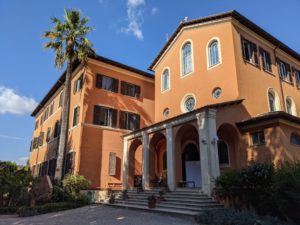2023 ILO in Rome Events
The inaugural 2023 International Latin Olympiad will take place on July 24-30 at St. Stephen’s School on the Aventine Hill in the heart of Rome. St. Stephen’s School is located a 4-minute walk from the Circus Maximus and within a mile of the Forum and the Coliseum. Among secondary schools, it has an unparalleled classics department, including studies in Greek, Latin, and Arabic. The school’s Classics Department oversees, together with the American University in Rome, an ongoing Roman-era archaeological excavation site adjacent to the school.
The International Latin Olympiad program details will be updated on a continual basis throughout 2021 and 2022, but as per our current plans, participants can look forward to the following:
-Oratorical, translation, grammar, vocabulary, recitation, debate, cultural, and historical simulation competitions, including an overall Olympiad champion for each age division
-Numerous sightseeing opportunities in and around Rome, including the Forum, Pantheon, Ara Pacis, Appian Way, Catacombs, Trajan’s Column, Hadrian’s Villa, Mausoleum of Augustus, Baths of Caracalla, Pyramid of Cestius, Arch of Constantine, and more
–Online Roman-themed video and computer game tournaments held in the weeks prior to the Olympiad
-A day trip to Pompeii, Herculaneum, and the National Archaeological Museum in Naples
-A Roman banquet complete with togas and recipes from Apicius

St. Stephen’s School is housed in a former villa and convent on the Aventine Hill.
- -Opportunities to speak Latin as a living language. At certain times, exclusive Latin usage will be obligatory. This will be facilitated through online tutorials in advance of the Olympiad.
- -An introduction to Indo-European, Italic, Latin, and Romance linguistics
- -Performing a play of Plautus in Latin (with English translation provided for the audience) inside the Forum or Coliseum
- -Performing a play of Plautus in Latin (with English translation provided for the audience) inside the Forum or Coliseum
- -Hands on introduction to Roman music, artistic methods, business practices, and daily life
